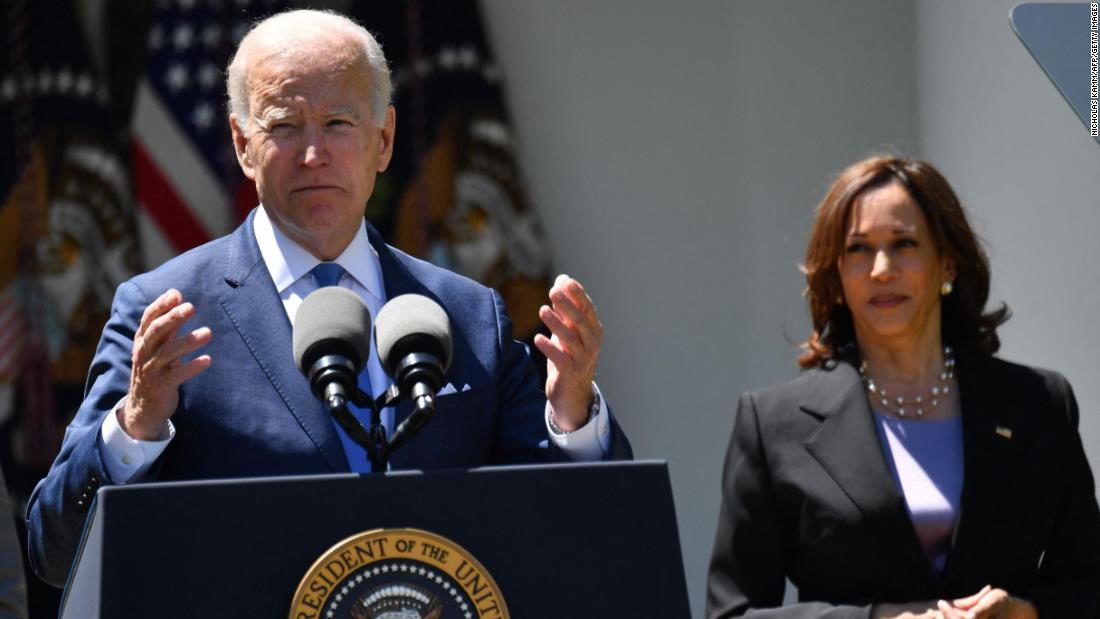
The President said the order will safeguard access to abortion care and contraceptives, protect patient privacy and establish an interagency task force to use “every federal tool available to protect access to reproductive health care.”
It will also increase public education efforts and bolster the security of and the legal options available to those seeking and providing abortion services, according to a fact sheet provided by the White House.
Biden laid out a hypothetical scenario, one that he believes to be more likely after the court’s ruling, to explain the stakes.
“A patient comes into an emergency room in any state in the union, she is … experiencing a life-threatening miscarriage, but the doctor is going to be so concerned about being criminalized for treating her they delay treatment to call the hospital lawyer, who’s concerned the hospital will be penalized if the doctor provides the life-saving care,” Biden said, speaking from the White House.
“It’s outrageous. I don’t care what your position is, it’s outrageous and it’s dangerous,” Biden said. He was joined by Vice President Kamala Harris and Health and Human Services Secretary Xavier Becerra.
There is no action the President can take to restore the nationwide right to an abortion in the wake of the Supreme Court’s ruling, and Biden has acknowledged publicly his options to expand abortion access remain limited.
Jen Klein, the co-chair and executive director of the White House Gender Policy Council, said Friday the White House is “looking at everything” to ensure access to abortion and that declaring a public health emergency “is definitely not off the table.”
Klein said the step had not been taken because the White House had determined that declaring a public health emergency “doesn’t free very many resources” and “doesn’t release a significant amount of legal authority.”
HHS is tasked with submitting a report within the next 30 days to the President regarding the implementation of the order’s provisions, which also include steps to increase outreach and protect the medical and digital privacy of patients seeking abortions.
In addition, the order establishes an interagency task force between the HHS and the White House Gender Policy Council, which includes Attorney General Merrick Garland, who the White House says will provide “technical assistance to states affording legal protection to out-of-state patients as well as providers who offer legal reproductive health care.”
During Friday’s event, Biden said he was asking the Justice Department, “much like they did in the civil rights era, to do something, to do everything in their power to protect these women seeking to invoke their rights.”
The President derided the Supreme Court’s decision as “extreme” and “totally wrongheaded,” saying, “What we’re witnessing wasn’t a constitutional judgment, it was an exercise in raw political power.” He added that that the court’s decision “has an impact much beyond Roe and the right to privacy generally. Marriage equality. Contraception. So much more is at risk. This decision affects everyone.”
Biden said the fastest way to restore abortion rights was for the American people to elect more members of Congress in November’s midterm elections who will support federal legislation protecting abortion access.
He said it was his “hope and strong belief that women will in fact turn out in record numbers to reclaim the rights that have been taken from them by the court.”
“Let me be clear: While I wish it had not come to this, this is the fastest route available,” Biden said.
Mini Timmaraju, the head of the prominent abortion rights group NARAL Pro-Choice America, said in a statement that the executive order is “an important first step.”
“We’re encouraged by the Biden-Harris administration’s work to defend abortion rights and access, and look forward to continuing partnership with the administration to make good on its commitment to championing reproductive freedom.”
The White House has dismissed several progressive ideas to protect abortion access, including allowing abortion providers to work from federal property in states where the procedure is banned.
White House press secretary Karine Jean-Pierre said using federal lands for abortion services would have “dangerous ramifications.” The White House has also reiterated the President does not support expanding the Supreme Court, as many progressives have pushed for.
But Biden said recently he would support making an exception to the filibuster — the 60-vote threshold in the Senate needed to pass most legislation — in order to codify abortion rights and the right to privacy through legislation passed by Congress. The President had previously been reluctant to support changing the Senate’s rules in order to pass his agenda.
This story has been updated with additional information.
